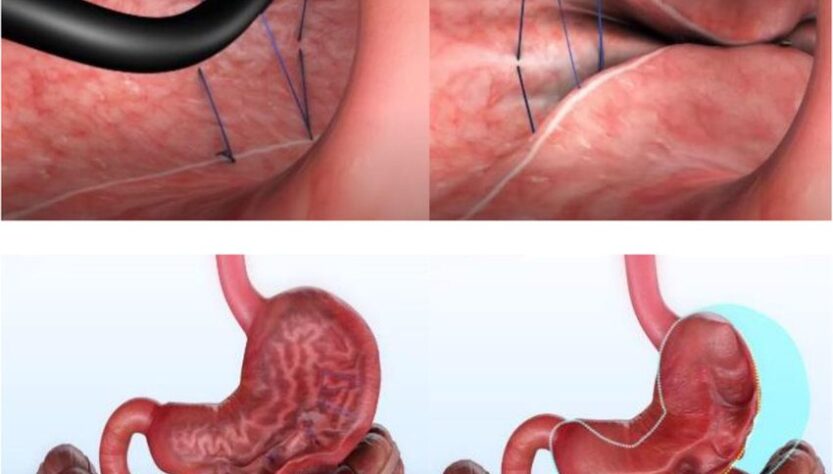Embarking on a weight loss journey has become more accessible thanks to technological advancements. Among the various minimally invasive and robotic procedures developed over the years, Endoscopic Sleeve Gastroplasty (ESG) stands out for its effectiveness. This procedure yields significant results with a minimal complication rate, making it a preferred choice for weight loss treatments. However, the effectiveness of the procedure heavily relies on making appropriate dietary changes post-surgery and over the long term. After undergoing ESG, your doctor will provide you with dietary guidelines to aid recovery, avoid complications, and maintain weight loss. To ensure a sustainable weight loss, consult with a reputable bariatric surgeon about the relevant dietary changes you need to make post-procedure. In this blog, we will give you a general idea about the dietary guidelines to assist you in achieving a healthy recovery after endoscopic sleeve gastroplasty.
What is Endoscopic Sleeve Gastroplasty?
Endoscopic Sleeve Gastroplasty (ESG) is a non-surgical weight loss procedure designed to help individuals achieve their weight loss goals effectively. Unlike traditional surgeries, ESG is not done through surgery and is performed endoscopically, requiring no incisions. During the procedure, a specialized device is inserted through the esophagus into the stomach. The device reshapes the stomach into a sleeve-like structure, reducing its capacity. This restriction on stomach volume helps patients feel full faster and consume smaller portions, ultimately contributing to their weight loss objectives.
Who are Eligible Candidates?
ESG is an appealing option for individuals who meet the following criteria:
- BMI between 30 and 40: Candidates should have a BMI (Body Mass Index) within this range, indicating obesity or overweight status.
- Previous Weight Loss Attempts: Candidates should have made previous attempts at weight loss, such as diet and exercise, without achieving significant or sustained results.
- Commitment to Lifestyle Changes: ESG is most effective when combined with lifestyle changes, including dietary modifications and increased physical activity. Candidates should be willing to make these changes for long-term success.
- No Previous Gastric Surgery: Candidates should not have undergone previous gastric surgeries.
- Good Overall Health: Candidates should be in reasonably good health, without significant medical conditions that may pose risks during the procedure.
These are general guidelines. If you are looking to assess your eligibility for endoscopic sleeve gastroplasty in the DFW area, consult a trusted bariatric surgeon who utilizes advanced means, including metabolic testing, to determine your eligibility for the procedure.
Dietary Tips to Follow After ESG
The success of ESG depends not only on the procedure itself but also on post-operative care and dietary modifications. Here’s a breakdown of the dietary progression you can expect to follow after ESG:
- Clear Liquid Diet: Immediately Post-Op
Immediately after ESG, patients are restricted to clear liquids only. This phase usually lasts for the first few days following the procedure and includes items such as water, clear broth, and sugar-free, non-carbonated beverages. Patients are advised to take small sips and avoid drinking too quickly to prevent discomfort. Consume the liquids at a moderate temperature for better tolerance. The consumption of caffeine and alcohol is completely prohibited, as they can lead to stomach irritation and dehydration.
- Full Liquid Diet: Week 1-2
After completing the clear liquid phase, patients transition to a full liquid diet, which includes items such as protein shakes, yogurt, and smooth soups. Prioritizing protein intake during this phase is essential to support healing and maintain muscle mass. Additionally, patients are advised to take their chewable multivitamins, calcium, and iron tablets to prevent the risk of mineral deficiencies. Reduced mineral levels can hinder optimal brain function, bone health, energy levels, and more, which may impede the recovery process. Therefore, it’s important to establish a routine for taking your medications and maintaining a consistent diet.
- Soft Diet – Week 2-4
After two weeks, patients can progress to a soft diet consisting of foods that are easy to chew and digest. This may include scrambled eggs, mashed potatoes, and well-cooked vegetables. Patients are advised to consume small portions, with three meals and one snack daily. Meals should prioritize protein and be consumed first. Simultaneous drinking and eating should be avoided, as the smaller stomach may not handle the pressure. Drinking should be paused 15 minutes before eating and resumed after 30 minutes. This practice will help minimize discomfort while ensuring proper fluid and protein intake.
- Solid Food – After week 4
At around the four-week mark, patients can gradually reintroduce solid foods into their diet. It’s crucial to prioritize nutrient-dense foods and practice portion control during this phase. Patients should aim to ensure that 75 percent of their diet consists of protein-rich foods. This is essential for curbing cravings. Slow eating and proper chewing are recommended to promote a feeling of fullness for a longer period of time. Foods that should be avoided include deep-fried and breaded proteins. Consistently maintaining a proper and healthy diet will naturally lead to better results from the procedure.
Conclusion
Endoscopic Sleeve Gastroplasty (ESG) offers a promising path to weight loss for eligible candidates. Its minimally invasive nature, combined with dietary and lifestyle changes, can lead to significant and sustainable results. If you’re considering ESG as an option in Dallas, consult with a reputable bariatric surgeon. Choose an expert bariatric surgeon who can provide the right course of treatment and guidance based on your evaluation. With the assistance of experienced bariatric surgeons available in Dallas, you can confidently embark on your weight loss journey and sustain it for the long-term.

